
INTRODUCTION With new technology trends such as the internet of things (IoT), many businesses have been able to improve their operations as well as make them more up to date. In the hotel and hospitality industry, technology has helped make many hotels and resorts more efficient as ones that are capable of providing better service for their guests. Technology in the hospitality industry has been able to capitalize on the internet of things (IoT) by providing a better user experience for guests. Today, guests can make reservations through an application and schedule their stay with their smartphones. Along with the internet of things, technology in the hospitality industry has also included new and more advanced software. The new hospitality technology has greatly advanced the operations of hotels in terms of allowing guests to get rooms and gain access to all of the available services offered. Today, the new hospitality technology can help hotels schedule events more efficiently, process room reservations and monitor revenues and financial transactions more easily. The development of hotel and hospitality software has enabled hotels to be even more organized than they have been in the past. As a result, they are even more likely to provide more satisfaction for their guests consistently. SMART GUEST EXPERIENCES Today many hotels have followed some key trends that have allowed them to better meet the unique needs of their guests. Along with using cloud-based software, hotels nowadays have become more personalized as they are even more focused on helping their guests have the best experience possible when staying at their establishment. In recent years, there has been a tech explosion in the hotel and hospitality industry. The use of cloud-based software has allowed hotels to more efficiently manage their transactions and daily tasks. It has also allowed guests to rely on apps and mobile websites to make requests and get the services that they need for their stay. This technology has helped make a modern hotel into a smart hotel as they have become more user-friendly. Another trend that has contributed to the development of the modern smart hotel has been seamless technology. This includes features such as mobile check-in and digital concierge services. Today, hotels provide high tech cards that detect the presence of a guest and open the door before they even get to it. This has provided guests with more convenience as they can just walk into their room instead of sliding a card into it. Mobile check-ins have enabled guests to process their arrival digitally and avoid relying on a front desk clerk to complete this task for them. As a result, both the guests and the hotel workers can save a lot of time. 7 TECH TRENDS YOU CAN’T IGNORE IN 2020 In the past hotels were just places for people to sleep and unwind during trips when they were away from home. However, there has been a lot of change in the industry during the past several years. Today, hotels have become places where several activities take place. These include seminars, business meetings, and conferences. There have been many additional hotel technology trends that have drastically changed the industry. 1. MOBILE DEVICES AS DOOR KEYS One of the most recent hotel technology trends has been the development of mobile devices as door keys. Hotels today provide cards that are items that put data onto a guest’s mobile device. With this card, guests can more easily access their rooms and other areas of the hotel such as the gym and spa. These cards can also be visually scanned to process entry into these areas of the hotel. 2. SERVICE AUTOMATION In recent years hotels have allowed guests to serve themselves. Most guests prefer to use technology rather than interact with humans. As a result, the development of remote check and check out has allowed guests to use apps to complete these menial tasks. Since the new technology has created more automation, both guests and hotel workers can spend more of their time focusing their efforts on other activities. 3. FIXED MOBILE CONVERGENCE Over the past few years, room phones in hotels have had a reduced role in use among guests. However, the room phones of the present and future will often provide a larger role in terms of connectivity. Today, a guest can use their mobile phone to control things such as the television, the sound system and the blinds of their room. They can also use the mobile phone to request wake up calls, get informed about a visitor’s arrival and requesting a cab or driving service to transport them around town. 4. GUEST APPS The new technology in the hotel industry has resulted in new guest apps. These are options that allow guests to receive information on new hotel deals, notifications about hotel services and also loyalty programs. The guest app can also provide an itinerary to an event as well. 5. BANDWIDTH With the development of technological devices such as laptops, smartphones, and tablets, the demand for bandwidth is very high. As a result, hotels have significantly increased the amount of available bandwidth to accommodate guests who frequently access the internet for the devices. 6. LOCATION-BASED SERVICES New location-based services have also emerged as a key to the advancement of technology in the hospitality industry. With location-based services, guests can locate hotel workers and staff more easily. As a result, they can more efficiently get the assistance they need whenever necessary. 7. TECH LOUNGES Another new trend in the hotel and hospitality industry has been tech lounges. With tech lounges, hotels can provide guests with a public space to use technological devices and complete tasks using technology. The new tech lounges have become a preference among many guests in recent years. CONCLUSION Like all other industries, the hotel and hospitality industry has undergone many significant changes over the past few years. Hotels have made these changes with the help of the latest hospitality and travel software. With this new hospitality and travel software, hotels have been able to help themselves operate more easily as well as satisfy the needs of their guests. During the last few years, hotels have introduced several technology options that include automated check-ins, staff location services, mobile door keys, and tech lounges to provide a more fulfilling experience for guests.
Create: Jan 26, 2020 Edit: Jan 26, 2020 International News
A 4% increase on the previous year which is also forecast for 2020, confirming tourism as a leading and resilient economic sector, especially in view of current uncertainties. By the same token, this calls for such growth to be managed responsibly so as to best seize the opportunities tourism can generate for communities around the world. According to the first comprehensive report on global tourism numbers and trends of the new decade, the latest UNWTO World Tourism Barometer, this represents the tenth consecutive year of growth. All regions saw a rise in international arrivals in 2019. However, uncertainty surrounding Brexit, the collapse of Thomas Cook, geopolitical and social tensions and the global economic slowdown all contributed to a slower growth in 2019, when compared to the exceptional rates of 2017 and 2018. This slowdown affected mainly advanced economies and particularly Europe and Asia and the Pacific. Looking ahead, growth of 3% to 4% is predicted for 2020, an outlook reflected in the latest UNWTO Confidence Index which shows a cautious optimism: 47% of participants believe tourism will perform better and 43% at the same level of 2019. Major sporting events, including the Tokyo Olympics, and cultural events such as Expo 2020 Dubai are expected to have a positive impact on the sector. Responsible growth Presenting the results, UNWTO Secretary-General Zurab Pololikashvili stressed that “in these times of uncertainty and volatility, tourism remains a reliable economic sector”. Against the backdrop of recently downgraded global economic perspectives, international trade tensions, social unrest and geopolitical uncertainty, “our sector keeps outpacing the world economy and calling upon us to not only grow but to grow better”, he added. Given tourism’s position as a top export sector and creator of employment, UNWTO advocates the need for responsible growth. Tourism has, therefore, a place at the heart of global development policies, and the opportunity to gain further political recognition and make a real impact as the Decade of Action gets underway, leaving just ten years to fulfill the 2030 Agenda and its 17 Sustainable Development Goals. The Middle East leads The Middle East has emerged as the fastest-growing region for international tourism arrivals in 2019, growing at almost double the global average (+8%). Growth in Asia and the Pacific slowed down but still showed above-average growth, with international arrivals up 5%. Europe where growth was also slower than in previous years (+4%) continues to lead in terms of international arrivals numbers, welcoming 743 million international tourists last year (51% of the global market). The Americas (+2%) showed a mixed picture as many island destinations in the Caribbean consolidated their recovery after the 2017 hurricanes while arrivals fell in South America due partly to ongoing social and political turmoil. Limited data available for Africa (+4%) points to continued strong results in North Africa (+9%) while arrivals in Sub-Saharan Africa grew slower in 2019 (+1.5%). Tourism spending still strong Against a backdrop of global economic slowdown, tourism spending continued to grow, most notably among the world’s top ten spenders. France reported the strongest increase in international tourism expenditure among the world’s top ten outbound markets (+11%), while the United States (+6%) led growth in absolute terms, aided by a strong dollar. However, some large emerging markets such as Brazil and Saudi Arabia reported declines in tourism spending. China, the world’s top source market saw outbound trips increase by 14% in the first half of 2019, though expenditure fell 4%. Tourism delivering ‘much-needed opportunities’ “The number of destinations earning US$1 billion or more from international tourism has almost doubled since 1998,” adds Mr Pololikashvili. “The challenge we face is to make sure the benefits are shared as widely as possible and that nobody is left behind. In 2020, UNWTO celebrates the Year of Tourism and Rural Development, and we hope to see our sector lead positive change in rural communities, creating jobs and opportunities, driving economic growth and preserving culture.” This latest evidence of the strength and resilience of the tourism sector comes as the UN celebrates its 75th anniversary. During 2020, through the UN75 initiative the UN is carrying out the largest, most inclusive conversation on the role of global cooperation in building a better future for all, with tourism to be high on the agenda.
Create: Jan 26, 2020 Edit: Jan 26, 2020 International News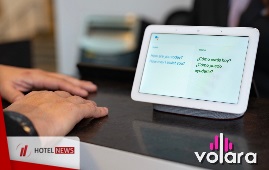
Voice on command is not just for the guestroom; Hoteliers are finding the Google Assistant’s interpreter mode + Volara to easily and accurately streamline guest communication Research suggests that customer-experience (CX) technologies that serve every touchpoint, add personalization and drive satisfaction were at the top of operators’ wish lists for 2020. To be effective and deliver a rapid return on investment, these solutions must successfully delight guests, increase operational efficiencies, inspire loyalty, and generate profits. One technology that is checking all these boxes – yet is often overlooked – is digital voice translation. Considering that 55% of households are expected to own smart speaker devices by 2022 and 50% of all online searches will be voice-based by 2020, demand for hyper-convenient voice interactions while traveling is on the rise. Powering rooms with voice controls is gaining momentum (30% of hoteliers say they plan to bring voice controls to the guestroom in the coming year), but hoteliers need to expand their voice strategies beyond those four walls to drive customer satisfaction, loyalty and revenues – especially if the hotel or brand is favored by international travelers. Global Travel Growth Sparks Demand for Voice Translation Amadeus commissioned a study to explore the trends shaping the future of travel. What it found was that Asia – home to about 4.46 billion people speaking nearly 2,300 languages – will account for almost 22% of global arrivals by 2020 (up from 18% in 2008) and the region’s residents will represent 32% of travel spending by 2020. To compete for a share of these travel dollars, hoteliers will need to communicate with these visitors who are fluent in Chinese, Hindi, English, Russian, Indonesian and Japanese. Furthermore, Europe is expected to produce 400 million more outbound travelers in 2020 than in prior years, most of whom will be speaking Russian, German, French, English, Turkish, Italian, Spanish, Ukrainian, Polish and Dutch. To help people better connect and get help, the Google Assistant introduced a featured called interpreter mode that translates conversations in real time. Provisioned and managed by Volara, named the ‘Best Voice Activated Tech Product of 2020’ by HotelTechReport last week, the technology is now being rolled out to hotels that will enable staff to communicate with global guests easily – and in their native language. The new voice translation technology is improving the quality of interactions between hotel staff and guests, resulting in better communications and high-value service. Google Assistant’s Interpreter Mode can translate 29 languages in real time, including: Arabic, Chinese (Mandarin and Cantonese), Czech, Danish, Dutch, English, Finnish, French, German, Greek, Hindi, Hungarian, Indonesian, Italian, Japanese, Korean, Polish, Portuguese, Romanian, Russian, Slovak, Spanish, Swedish, Thai, Turkish, Ukrainian and Vietnamese. With Volara’s support, hotels can receive a Google Nest Hub to place at their front desk or Concierge station. When a guest needing translation assistance approaches, the staff simply says “Hey, Google, be my Spanish interpreter.” Then, the interpreter mode will show text on the screen that translates their words as they speak and repeat the message in English. This technology will enable international travelers to receive voice-automated professional hospitality in real time when they travel. The Google Assistant’s Interpreter Mode + Volara Places Hyper-Focus on Staff While this translation technology is driving hyper-convenient interactions with guests, it is also enabling hoteliers to elevate their staff. According to the 2019 Customer Engagement Technology Study, 42% of hoteliers will be investing in staff-facing technologies in 2020 to enhance the customer experience. Happy employees mean happy guests, and happy guests spend more money. By giving hotel staff tools that will make it easier for them to do their jobs, it will ultimately increase guest satisfaction and drive revenues. Perhaps that’s why 27% of hoteliers say they plan to add guest-facing self-service technology next year, and 24% are looking for technologies that automate service – both of which can be accomplished by the Google Assistant interpreter mode. When looking at the key to unlocking ROI from customer experience technology, 2019 CET Study authors Daniel Connolly, Dean of the College of Business & Public Administration at Drake University, and Jungsun (Sunny) Kim, Associate Professor at the William F. Harrah College of Hospitality, UNLV, had this to say: “To remain relevant and competitive, hospitality leaders must be agile enough to adapt to shifting consumer demands and have a willingness to take calculated risks into uncharted territory if they are to stand out and capture new market share.” Digital voice translation technology may be uncharted territory to some, but those agile hotels and brands who are embracing it are finding it to be the missing link for improving guest engagement.
Create: Jan 18, 2020 Edit: Jan 18, 2020 International News
Frontline Employee Recruitment and Selection Technique 1 Design Creative Job Announcements; In order to draw a strong applicant pool for open posi- tions, the position announcements must be well-crafted. The hotel’s marketing department should either write or help edit such descriptions. Without sacrificing truth in advertising, creative-minded marketers can often produce more interest- ing and appealing announcements than those who are more operations-minded. Technique 2 Foster Relationships with Educational Institutions; Often, the best line-level associates and entry-level manag- ers can be drawn from trade schools, colleges, and universities that offer hospitality management programs. All hotels (even free-standing, independent hotels) should have active relation- ships with one or more hospitality educational institutions. Technique 3 Participate in Career Events; A representative from the hotel’s management team should speak at local high school career days. Not only does this exposure foster positive community relations, but also the students are a good source of potential employees for certain positions. Technique 4 Encourage Employee Referrals; Line-level associates should be encouraged to recruit their friends for open positions. Because the line-level employee is knowledgeable about the hotel’s working culture and also knows his/her friends, this combination of knowledge puts him/her in an informed position to assess the potential match. Technique 5 Utilize 360-Degree Interviewing; Utilize 360-degree interviewing in which a candidate is interviewed not only by who s/he will be reporting to, but also by peers and potential subordinates. While this approach mandates interview training, there are several benefits. Namely, when a candidate is interviewed by future subordi- nates, his/her emotional intelligence, and rapport-building skills can be assessed. The 360-degree interviewing also gives those involved a sense of buy-in and engenders an empower- ment culture. Technique 6 Use Panel-Style Interviewing; Front-of-the-house position candidates should be sub- jected to the panel-style interviewing in which they are interviewed by more than one person at once. Panel-style interviewing allows for the ability to test a candidate’s confi- dence and conversational ability in a situation in which some would find intimidating. For the purpose of practicality, a panel interviewing approach can be combined with the 360 degree interviewing described in the previous technique. Technique 7 Encourage Multiple-Day Interviewing; Whenever possible, applicants for the line-level positions should be asked to return for interviews on more than one day in order to gauge their dependability and demeanor at various points in time. Technique 8 Assess Applicant Conversational Ability; During interviews, front-of-the-house applicants should be asked questions that test their conversational abilities. One such question might include ‘If an alien lands on earth, how would you describe to the alien how to make a peanut butter and jelly sandwich?’ Technique 9 Assess Applicant Creativity; During interviews, front-of-the-house applicants should be asked to complete tasks that assess their creative talents. For instance, they could be given four minutes to write all of the uses that can be thought of for an object (e.g., a blanket) and then given four more minutes to write all of the uses that can be thought of for a different object (e.g., a brick). This task is termed a divergence test, and responses can be rated based upon the following criteria : 1- F luency—how many meaningful ideas are generated in response to the stimuli? 2- O riginality—how rare are the given responses? 3- E laboration—how much detail is contained in the responses? Technique 10 Assess Applicant Team-Mentality; During interviews, front-of-the-house applicants should be asked to tell a story about a time when they delivered exceptional customer service experience either at a hotel or any other service business. Candidates who recount stories in which they worked with past coworkers to deliver the experi- ence are likely more team-oriented than those who only discuss their own actions . Technique 11 Assess Applicant Problem Solving Skills; During interviews, a technique should be used to gauge the problem-solving skills of frontline associates. One such technique entails showing the candidate a container filled with small items, such as paperclips, and asking how s/he would go about estimating the number of items in the con- tainer (without opening it). Technique 12 Assess Applicant Innovativeness; On the application form for college students to intern at the hotel, ask the internship applicants to write a paragraph detailing a creative solution to a problem. For example: “Please describe one innovative solution to reducing guests’ perceived waiting times at check-in.” Technique 13 Incorporate a Walk-Through During an Interview; As part of the interview process, walk the applicant around the job area and observe how s/he interacts with the employ- ees as well as the guests. These observations provide a glimpse into the likely tone of interactions they will have if hired. In addition, when you let him/her see the work area and tasks, s/he may decide this is not a good fit or might become more excited about the prospect of working there. Technique 14 Incorporate a Slideshow During an Interview; When interviewing a job candidate, if the interviewer is pleased with the performance of the candidate, the inter- viewer should complete the meeting by showing the can- didate a slideshow on his/her laptop. The slideshow should include pictures of team members and pictures of them interacting. While viewing the pictures, stories can be shared regarding how the team members have been developed to be key players. Technique 15 Reinforce Reputation During an Interview; When interviewing a job candidate, if the interviewer is pleased with the performance of the candidate, the inter- viewer should make a point of telling the applicant about some of the accolades won by the hotel, the brand, and/or the man- agement company.
Create: Jan 18, 2020 Edit: Mar 7, 2020 Hotel Management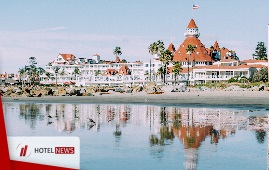
Eden Prairie (Minneapolis) MN, January 2020 … Bigger, bolder and now independent – Big Box Hotels are increasingly breaking off from major brands and deploying their expansive meeting spaces, extensive room inventory and outstanding technical services to become independent operators. It’s a growing trend that offers planners the advantages of a large hotel accommodating groups of up to 3,000 attendees while providing a level of flexibility and creativity once reserved for boutique properties and smaller brands. Teneo Hospitality Group, the leading group representation firm, is responding to this development by introducing its newest collection of member hotels – the Big Box Collection, which now includes 52 independent and smaller-branded member hotels across the United States, Europe and Dubai, United Arab Emirates. Eleven of these are offering special hot dates and incentives, available throughout 2020 and accommodating meetings in several prominent destinations including Boston, Chicago, Dallas, Honolulu, Orlando, Reno, San Diego and the Temecula Valley Wine Country in California. “This move from Big Box brands to independent status is a significant trend,” says Teneo President Mike Schugt. He notes that for the last 20-30 years, many boutique hotels have transitioned to independent or soft branded properties. This paved the way for many larger, branded properties to declare their independence and reap the benefits of autonomy. Big Box brands are able to provide far more options to planners and guests, unfettered by frequently inflexible policies of a large corporate brand. Often operating without a brand name, these newly independent hotels have embraced a creative, personalized culture based on the offering’s boutique hotels initiated 20 years ago. “We now see highly-customized, catering-to-all-your-senses experiences available to larger groups in the Big Box hotels we represent,” says Mike Schugt. Hoteliers are capitalizing on the new opportunities to bring in the best, most personalized aspects of the boutique concept – customized service that focus on issues important to guest satisfaction. These include sustainability, curated experiences, imaginative décor, music, scent, lighting, original art and architecture, raising the bar in food and beverage services – all without the cookie-cutter limitations that can be imposed by major brands. Planners should welcome this growing trend, according to Schaan Baker of Phillips Ultrasound. “The Big Box concept gives planners new options, sophisticated technical services, greater value and return on investment, a chance to explore new destinations, and the creative energy and resourcefulness of an independent or smaller brand property,” she notes. This creative, flexible approach lets hotels showcase the best of their destination. For example, the Boston Park Plaza, a Boston icon for nearly a century, has added a loft-like contemporary event space, Avenue 34, to its three magnificent ballrooms. In Hawaii, the new Alohini Resort, Waikiki Beach, offers a spectacular lobby Oceanarium and the Thrillist, an adventurous program of helicopter tours and horseback rides to plant legacy trees in Hawaii’s forests. At the Omni Dallas, planners can see their brand’s name in lights on the Dallas skyline, thanks to the mile of LED lights placed around the building. “By declaring their independence, many larger hotels are able to create their own, singular brands, free from rigid corporate policies and operating restrictions,” says Mike Schugt. He also notes that the trend toward autonomy dovetails perfectly with planners’ demand for more diverse meeting space, greater options in accommodations and the most sophisticated technology. At the same time, planners are calling for a less rigid, more open approach to the planning process. “Independent hotels are better able to provide a creative, workable and unique environment,” says Mike Schugt. He also sees this trend expanding and continuing for the foreseeable future. “Over 50 Big Box hotels have recently become independent,” Mike Schugt says. “We are proud that a significant number of them have become Teneo members, recognizing our commitment to promoting independent hotels and smaller brands.” Hotels in Teneo’s Big Box Collection, offering Hot Dates and Special Promotions throughout 2020, span historic landmarks, beachfront resorts, sophisticated urban hotels and major conference center hotels accommodating up to 3,000 attendees. -Alohini Resort, Waikiki Beach, Honolulu, Hawaii -Boston Park Plaza, Boston, Massachusetts -Caribe Royale, Orlando, Florida -Hotel del Coronado, San Diego, California -The Fairmont Chicago Millennium Park – Chicago, Illinois -The Fontainbleau, Miami, Florida -The Loews Meeting Complex at Universal Orlando, Orlando, Florida -The Omni Dallas, Dallas, Texas -The Pechanga Resort and Casino, Temecula, California -The Peppermill Resort Spa & Casino, Reno, Nevada -Rosen Hotels, Orlando, Florida
Create: Jan 11, 2020 Edit: Jan 11, 2020 International News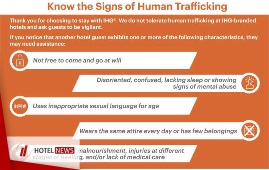
January is recognized as National Slavery and Human Trafficking Prevention Month in the US and IHG® has intensified its ongoing effort to fight human trafficking. The company has introduced new programs, tools and resources for colleagues to increase awareness and aid prevention of human trafficking, including a free training available to all IHG-branded hotels worldwide, including more than 4,200 properties in the Americas. Human trafficking, a form of modern slavery, is a $150 billion criminal enterprise that brings suffering and injustice to an estimated 40 million men, women and children across the globe, according to the International Labor Organization. It is a domestic and international issue that is present in communities of all sizes with individuals of all ages and backgrounds trafficked and exploited for purposes including sexual abuse and forced labor. Elie Maalouf, Chief Executive Officer, Americas, IHG, said: “At IHG, we condemn human trafficking in all forms, and we are taking a strong stance in partnership with our owners, elected officials and others in the industry. We are committed to protecting our guests, communities and owners from the impact of human trafficking as well as maintaining the integrity of IHG’s brands. We will not tolerate it, or those who would enable it, in the IHG system of hotels, and we are empowering all of our colleagues with the tools, resources and support they need to combat this crime on every level.” Most recently, in December, IHG hosted dozens of colleagues from local Georgia hotels for a group training and discussion at the Crowne Plaza® Atlanta Perimeter at Ravinia, located near the company’s Americas headquarters in Atlanta. During the event, attendees learned about the work to fight human trafficking in Georgia from First Lady Marty Kemp, as well as support and assistance programs available for survivors from Mary Frances Bowley, founder and executive director of non-profit Wellspring Living. “Our partnership with the hotel and lodging industry is forged by a common goal: ending human trafficking in Georgia,” said First Lady Kemp. “I applaud IHG’s efforts to train employees on identifying the warning signs of trafficking and supporting survivors. Education and awareness are key in this critical fight, and this training equips staff with the potential to save lives.” IHG has released a new video featuring a one-on-one conversation with First Lady Kemp and Colleen Keating, Chief Operating Officer, Americas, IHG, where the two leaders discuss the importance of public-private partnership in the fight against human trafficking and progress in the state of Georgia. Since its launch in summer 2019, colleagues in more than 2,300 hotels across the U.S., Canada, Latin America and the Caribbean have completed IHG’s online anti-human trafficking training. The company expects colleagues in all IHG-branded hotels in the region to have completed the training by March 2020. Additionally, IHG continues to work closely with a variety of organizations such as the American Hotel & Lodging Association (AHLA), Asian American Hotel Owners Association (AAHOA) and Georgia Hotel & Lodging Association (GHLA) to share best practices, coordinate efforts and attack the issue on all levels. The company has also engaged in additional collaborative efforts, such as commitments to ECPAT and the criteria of The Code, as well as the AHLA 5-Star Promise. IHG also actively supports non-profit organizations that provide essential goods and services to support the recovery of human trafficking survivors, and coordinates regular volunteer opportunities for colleagues. IHG is a global company with a presence in more than 100 countries. The company considers addressing human trafficking a key component of its larger commitment to responsible business and at the core of how it operates. Read more about the company’s position and its consistent standard across every market in its global Human Rights Policy.
Create: Jan 11, 2020 Edit: Jan 11, 2020 International News
Adventure tourism is one of the fastest growing segments of the tourism industry, with a global market valued at $586 billion in 2018, and projected to reach $1,627 billion in 2026. However attractive this sector seems to be, drawing adventure tourists is no easy feat. Adventure travel providers need to understand, first of all, that travel trends and travelers’ preferences keep changing from time to time. What works this year may not work next year. Tourism professionals therefore have to always stay ahead of the curve. Today, there is a real thirst for authenticity of a destination, bound up with sustainability concerns including support for local businesses, reducing plastic consumption, community outreach and cultural sensitivity, especially in the adventure travel sector. Adventurers used to prioritise personal challenges and individual thrills. Now that “authenticity” ascends as the travel buzzword, they prefer to immerse themselves in authentic and local culture, from the history and traditions of the place to gastronomic routes and local products. This change of trend is reflected in the world’s largest tourism source market. Chinese tourists are becoming less satisfied with superficial tourist activities and shopping and increasingly driven by a desire to explore authentic, social and shareable experiences at the destinations they travel to. Accordingly, tourism providers in many countries are now providing different types of tourism products which create an authentic tourism experience. In Australia, tourists can participate in indigenous tourism activities such as traditional festivals, dances and guided tours, together with aboriginal Australians. Another example is the cookery classes offered in South-East Asian countries such as Thailand, Vietnam and Indonesia, in which tourists have the opportunity to cook with a local chef using local ingredients, recipes and cooking techniques. Not only do tourists today want to have unique, personalised journeys, they also want to create a positive impact when they travel. According to Booking.com, 72% of travelers makes more sustainable travel choices, and up to 73% of global travelers intends to stay in an eco-friendly or green accommodation.* “Travellers are thinking about who we’re giving our money to, where it’s going and how our actions and that of our accommodation choices could be kinder to people and places,” Juliet Kinsman, founder of bouteco.com, told National Geographic. Despite good intentions, the survey reveals that 37% of global travelers do not know how to make their travel more sustainable. The challenge thus lies not only on travel providers to have a strategy for sustainability but also to effectively communicate it to their clients. Some may struggle with initiating sustainability approaches or creating meaningful authentic products, while others do not know how to send a message to the audience. On February 12-14, 2020, international experts will gather in Kota Kinabalu, Sabah, Malaysia to address these issues as well as discuss opportunities in this dynamic tourism sector at the PATA Adventure Travel Mart and Conference 2020. Under the theme “Ahead of the Curve: Authenticity and Sustainability in Adventure,” the one-day conference includes concurrent sessions that allow participants to delve deep into the top trending themes in travel: sustainability and authenticity. Each session features a 45-minute presentation, followed by a 1.5-hour workshop with working exercises. Led by Eric Ricaurte, Founder & CEO, Greenview (Singapore), the Sustainability Track will look into responsible initiatives used by tour operators, accommodations and destinations – and how to message them to clients, including best practice examples from companies around the world and guidance on how to integrate sustainability ideas into day-to-day business operations. The Authenticity Track will looks at how to integrate adventure elements into tour programmes, including how to identify and use local resources (guides, food, architecture, etc) to create more authentic and meaningful experiences for travellers. This track will be led by Dan Moore, CEO, Consultant, Lead Facilitator, Pandion Consulting & Facilitation (USA). The PATA Adventure Travel Conference and Mart (ATCM) 2020 is Asia Pacific’s leading travel trade event dedicated to the adventure travel industry.
Create: Jan 11, 2020 Edit: Jan 11, 2020 International News
Hilton announced the opening of Canopy by Hilton Hangzhou Jinsha Lake, a 10-storey, 179-room hotel that provides energizing, positive stays for business travelers and cultured vacationers. The waterfront hotel is conveniently located in the heart of Qiantang New District of Hangzhou East, offering a unique urban resort experience coupled with the city’s best views of Jinsha Lake. Canopy by Hilton Hangzhou Jinsha Lake marks the brand’s twelfth property and is owned by Vangoo Group and managed by Hilton. “With the rapid development of the high-tech and manufacturing industry and rich cultural heritage, Hangzhou Qiantang New District has immense potential in attracting leisure and business travelers,” said Qian Jin, area president for Greater China and Mongolia, Hilton. “Following the huge success of the brand’s Asia Pacific debut in Chengdu, we are thrilled to announce the second opening in the region in Hangzhou. The property underscores our commitment to maintain strong growth momentum in Greater China and continue to deliver positive experiences to our guests.” Once a wetland for farmers more than 2,200 years ago, the neighborhood where Canopy by Hilton Hangzhou Jinsha Lake resides has transformed into a hotbed for technological innovation and a growing destination for business events. Ideally located by the lake, the hotel is only a few blocks away from a shopping mall, dining outlets and the soon-to-launch Jinsha Grand Theatre, offering guests seeking local experiences the perfect base to discover local cuisine or enjoy a relaxing stroll along the lake’s shore. Guests can enjoy direct access to Hangzhou Metro Line 1 for quick connections to business districts, major scenic destinations and Hangzhou East Railway Station, and Xiaoshan International Airport is located only 25 kilometers away, just 30 minutes by car. “Through the neuroscience research we conducted in partnership with Nielsen earlier this year, we found that today’s Chinese travelers seek a taste of authentic local experiences during their travels, which is exactly what Canopy by Hilton offers at this new location,” said Gary Steffen, global head, Canopy by Hilton. “The hotel will immerse guests in Qiantang New District’s natural beauty and heritage with its architectural and design elements.” Canopy by Hilton Hangzhou Jinsha Lake has been carefully designed to incorporate the unique art culture of Hangzhou. Upon arrival at the hotel lobby, Canopy Central, guests will be greeted by a white ceramic centerpiece floating above the lobby inspired by the Osmanthus, the city’s flower, which is traditionally planted in front of local homes and known as a “golden welcome” to guests. The 3D-grafted decorative wall panels along the hotel corridors feature continuously changing illustrations of aquatic plants and marsh birds, immersing guests in the nature of Hangzhou.
Create: Dec 23, 2019 Edit: Dec 23, 2019 International News
Margaritaville Hotel Nashville, the newest addition to the Margaritaville portfolio, brings an entirely unique lodging concept to the destination with a “no worries” casual luxury atmosphere. Developed by Safe Harbor Development LLC and managed by Davidson Hotels & Resorts, the 12-story hotel features 166 guestrooms, as well as 52 Margaritaville Vacation Club® by Wyndham suites, and is centrally located a half block south of the Music City Center, near Broadway. Amenities include a rooftop relaxation and entertainment area with an outdoor pool, sundeck, fire pits and live entertainment; a 24-hour fitness center; and two first-ever Margaritaville dining concepts – FINS Bar and JWB Grill. “We’re thrilled to offer a one-of-a-kind experience where guests can revel in the excitement of Nashville while simultaneously enjoying the Margaritaville state of mind,” said Jeff Webb, general manager of Margaritaville Hotel Nashville. “It’s a wonderful feeling to be able to welcome guests to the first urban destination Margaritaville hotel.” Situated in Nashville’s bustling South of Broadway (SoBro) neighborhood, the hotel is steps away from the Country Music Hall of Fame, Bridgestone Arena, Music City Center, Honky Tonk Highway and more. Drawing from Nashville’s vibrant cultural and entertainment scene and inspired by the lyrics and lifestyle of singer, songwriter and best-selling author Jimmy Buffett, Margaritaville Hotel Nashville offers an elevated design with a laid-back metropolitan attitude. Crisp white bedding and teak finishing create a sense of escapism within each guest room, while playful colors and tasteful tropical decor add to the island setting among the restaurants and bars. In addition to FINS Bar, JWB Grill, and with music and entertainment at its core, the hotel also includes nearly 11,000 sq. ft square feet of indoor and outdoor customizable space, setting the stage for corporate group events, weddings and celebrations in downtown Nashville. The 52 vacation club suites offer owners plenty of space to kick back and relax, with mini kitchens and separate living and dining areas in the apartment-style suites. The property is now home to Radio Margaritaville’s Nashville studio, heard worldwide on SiriusXM Channel 24. Live broadcasts, special guests and a mix of Jimmy Buffett, island, rock, reggae and country will hit the airwaves from a new state-of-the-art studio in the lobby, bringing the sounds of the tropics to Nashville. SiriusXM subscribers are able to listen to Radio Margaritaville channel 24 on SiriusXM radios, and those with streaming access can listen online, on-the-go with the SiriusXM mobile app and at home on a wide variety of connected devices including smart TVs, devices with Amazon Alexa or the Google Assistant, Apple TV, PlayStation, Roku, Sonos speakers and more. Go to www.SiriusXM.com/streaming to learn more. “We are excited to partner with Margaritaville and Davidson Hotels & Resorts to introduce Margaritaville Hotel Nashville, destined to be a destination of its own in the thriving city of Nashville,” said Darby Campbell, owner and president of Safe Harbor Development LLC, and lead investor on the project. “We’re proud that this property manages to convey a vibrant yet laid back attitude and there are no better partners than Davidson and Margaritaville to bring this hotel to life.”
Create: Dec 16, 2019 Edit: Dec 16, 2019 International News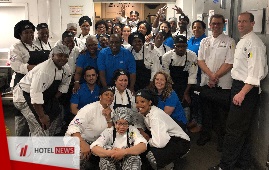
Hilton’s efforts will feed more than 160,000 annually, while diverting millions of pounds of food waste from landfills McLean, Va. – As the holiday season approaches, Hilton (NYSE: HLT) is announcing the expansion of its innovative food donation initiative to all of its managed hotels across the United States and Canada, representing one of the largest hotel food donation programs to date. The company expects to donate nearly 100 tons of food over the next year — enough to feed more than 160,000 people — while also diverting millions of pounds of food waste from landfills. “We have a century-long tradition at Hilton of playing a pioneering role in the hospitality industry, and it is inspiring to see our Team Members taking that spirit out into their communities to address the serious problem of food insecurity,” said Chef Marc Ehrler, Vice President of Americas Culinary, Hilton. “What started as a pilot in a few of our hotels has become a movement because our Team Members are motivated by a desire to have a positive impact.” Approximately one-third of food is wasted worldwide, yet global food insecurity remains endemic. It is estimated that more than 41 million Americans, including 13 million children, currently suffer from food insecurity. Meanwhile, most food waste ends up in landfills where it produces nearly 10% of the global greenhouse gas emissions that contribute significantly to climate change. In response, Hilton included an ambitious commitment to reduce its food waste by 50% by 2030 as part of the company’s Travel with Purpose 2030 Goals to cut its environmental footprint in half. Working with its environmental partner, World Wildlife Fund (WWF), Hilton undertook pilots at 50 hotels around the world to better understand food waste reduction challenges and opportunities in the hospitality industry. The pilots resulted in a number of innovations in Hilton hotels, from “no-waste” catering menus to thoughtfully designed buffet presentations. “At Hilton, we have incredible potential to solve some of society’s most pressing challenges through our hospitality mission,” said Katie Fallon, Executive Vice President of Corporate Affairs, responsible for Hilton’s corporate responsibility efforts. “We will keep at this until every one of our hotels around the world is diverting food waste to address the hunger crisis, so that our guests know that when they stay with us, they are traveling with a purpose.” Hilton also participated in the development of the Hotel Kitchen toolkit, a free tool developed by WWF and the American Hotel & Lodging Association with funding from the Rockefeller Foundation, which provides hotels with techniques to reduce food waste. Hilton has implemented the Hotel Kitchen toolkit and its associated trainings at all of its managed hotels in the Americas, while also making the toolkit available to its franchised properties. Now, Hilton is expanding its food waste initiative by encouraging its 300 managed hotels in the US and Canada to partner with local food rescue organizations to feed the hungry in their immediate communities. Each hotel will set a food waste diversion and donation goal for 2020 and report their progress so top performers can be recognized each month. Hotel teams will be able to select organizations to work with from a robust directory of food donation and diversion partners from across the country, as well as connect with one another to share best practices. Examples of existing partnerships include: 1. Hilton San Francisco Union Square has worked with Food Runners for nearly 15 years, providing nearly 2.5 tons of food to the organization annually. Food donated by Hilton is relayed by Food Runners’ volunteers to programs serving seniors, veterans and the homeless. 2. New York Hilton Midtown donates excess edible food to the Rethink Food Program, which picks up unused food from restaurants, farms, and other food purveyors to repurpose it into delicious and nutritious meals for under-served New Yorkers. 3. Waldorf Astoria Las Vegas donated nearly a ton of food over the last year to its partner Three Square, which distributes the food to local non-profit organizations. 4. Hilton’s food donation program is initially focused on the US and Canada because food donors in those countries are legally protected from liability under Good Samaritan laws, but the company’s goal is to expand these efforts globally. Donation efforts are already being driven at many of Hilton’s hotels around the world, including partnerships with groups like Scholars of Sustenance in Thailand and Indonesia, Oz Harvest and Addi Road Food Pantry in Australia, the Egyptian Food Bank, Equoevento in Italy, and Al Rescate, the first food rescue program created specifically for the hospitality industry in Mexico. Hilton measures its food waste progress using the company’s cloud-based corporate responsibility management system, LightStay. All properties are required to use LightStay to measure their environmental and social impact. So far this year, Hilton hotels in the Americas have diverted more than 6 million pounds of food waste from landfills, an equivalent of more than 11,000 MT of carbon emissions.
Create: Dec 16, 2019 Edit: Dec 16, 2019 International News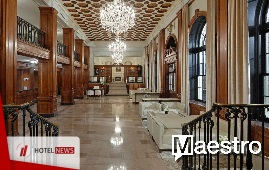
Lord Nelson Hotel & Suites is an independently owned 262-room historic property with 12,500 square feet of meeting space in Halifax, Nova Scotia. In 2018 it completed a full renovation of its guestrooms, meeting space and common areas. The property benefited from a large increase in area tourism with new market segments and international guests. These factors made it clear to management that Lord Nelson’s legacy property management system (PMS) did not provide the functionality the hotel required and triggered its search for new hotel software. Lord Nelson Hotel & Suites is a locally owned historic independent that wanted to keep its historic heritage but move property operations into the 21st Century. “We took time to make the right decision,” said Kathryn Buttle, Lord Nelson’s Assistant General Manager- Revenue. “We wanted a cloud-based PMS that supported the specific hotel software modules we needed on one platform. Maestro’s suite of fully-integrated modules on a single-image database was ideal for the unique way we do business.” Lord Nelson Hotel & Suites installed Maestro’s Front Desk, Sales and Catering, ResWave Online Direct Booking engine, Mobile Housekeeping, SMS Messaging for guest and staff communications, Digital Registration for remote check-in, Travel Agency accounting, and Yield Management to optimize rates and occupancy all on the Maestro Web cloud-based system. They also recently added the integrated Online Payment Portal and are considering expanding to Maestro’s Loyalty Module and Business Analytics. “We recently discovered an unexpected benefit with Maestro,” Buttle said. “The property was hit with a power failure during a storm. When the power went out, the Maestro Web cloud-based system enabled us to continue operation using our tablets and mobiles. We ran our hotel on iPads. Maestro’s Mobile Housekeeping module even kept our housekeepers doing their job with tablets.” System selection guidelines for independent operators “I recommend that independent operators take time to list all the factors they need to make the right decision. They should bring their teams together to understand how each department does business,” Buttle said. “We began by listing the modules we wanted and reviewed each department’s processes. Our evaluation list included six PMS companies. We had numerous calls with each company and arranged multiple demonstrations over a six-month period. I worked with our IT manager to balance our property’s needs with what each system offered.” The property told vendors the issues it had with its current system, and explained what functionality was non-negotiable. “We created a firm baseline for functionality we had to have. We asked each company specific questions about processes and interfaces. We described our tasks and asked how their system handled them. We focused on the most important modules to our operation. For example, we are a 40-percent group property, so an integrated, full-function Sales and Catering system was essential.” Maestro PMS was the best system for Lord Nelson Hotel & Suites “Since we are an independent property, professional training and support were principal factors in our decision process,” Buttle said. “In addition, we wanted a cloud-based system to simplify our infrastructure requirements. Based on our functionality requirements and system evaluation we selected the Maestro PMS suite of modules on the Maestro Web cloud platform. It has been a good decision for our operation.” Maestro’s Sales and Catering System also proved itself to Lord Nelson’s operation. “We use an outside caterer,” Buttle said. “Maestro’s Sales and Catering system is flexible enough to let our third-party vendors update their event covers, menus, and billing details to keep our operation running smoothly. Our system installation and training went very well and Maestro’s support is excellent. Maestro online Live Chat Support lets our staff get answers to system use questions in real-time to be more productive. Plus, if we request an enhancement, Maestro evaluates our request and tells us when they can deploy it at our property.” The Maestro Property Management System is the preferred hotel software for independent hotels, resorts, conference centers and multi-property groups. It delivers flexible and scalable deployment options with an identical full-featured web browser or windows solution available in the cloud or on premise. Click here for more information on how to engage and socialize with Maestro PMS.
Create: Dec 11, 2019 Edit: Dec 11, 2019 International News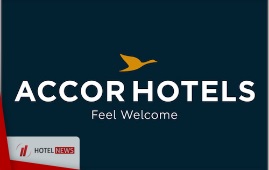
When stepping into a hotel these days, one cannot help but notice a growing wave of smoothie bowls, pilates poses, and mindfulness seminars. For many years, Accor has been at the forefront of the wellbeing movement, leading the way to integrate health and wellness into all aspects of the guest experience. In a new white paper, “It’s a Wellness World: The Global Shift Shaking up Our Business”, Accor explores the fundamental societal shift currently underway as the lifestyle goal of feeling healthier has moved out from beyond the walls of the spas and gyms and entered the mainstream. The informative report goes on to discuss the opportunities the wellness movement provides for hoteliers and some of the unique ways that Accor brands will deepen their commitments in this vital area throughout 2020 and beyond. “At Accor, our goal is to have guests experience a sense of wellbeing during their stay and that they leave feeling better than when they arrived; better rested, more nourished and in a happier state of mind,” said Emlyn Brown, Global Vice-President, Wellbeing, Luxury & Premium Brands, Accor. “A delighted guest is naturally more inspired to return. Therefore, by investing in holistic wellness experiences that help our guests feel good throughout the customer journey, we are establishing a model for strong revenue growth through return bookings, word-of-mouth referrals, and positive social media presence, contributing to a steady and sustainable business for years to come.” “It’s a Wellness World: The Global Shift Shaking up Our Business” reveals that 77% of consumers “take steps in their daily lives to stay healthy, make informed food choices, stay active and manage stress.”* Furthermore, some 56% of affluent travelers place a top priority on the statement, “I’m striving to become healthier in the coming year.”** The report also explores numerous economic and social factors that are driving the rise of wellness around the world. “As the wellness movement matures, and wellness offerings become a standard expectation within the hospitality industry, we are seeing a growing emphasis not only on healthy food options, relaxation, and movement but on such fundamental health necessities as clean water and air,” said Anne Dimon, CEO & President of the Wellness Tourism Association. “The mindset of wellness has evolved beyond spas and workout spaces, challenging the hospitality industry to consider how it integrates other health considerations such mindfulness and time spent in nature, along with environmental concerns – such as reducing indoor pollution and eliminating plastics – into its daily operations.” Accor’s well-being white paper will act as a catalyst to help energize the company’s wellness teams globally, while also informing and enhancing the five key pillars that guide Accor’s overall approach to well-being – Active Nutrition, Holistic Design, Bodies in Movement, Leveraging Spa, and Embracing Mindfulness – all of which are adapted and adopted by the company’s hotel brands based on a number of important factors including guest preference, demographics, brand positioning, culture and location. The report also delves deeper into this tailored approach and showcases several examples of how some of Accor’s leading hotel brands are uniquely evolving with the wellness movement. For example: Raffles Hotels & Resorts creates bespoke experiences to enhance guests’ emotional wellbeing, allowing them the opportunity to experience serenity, harmony, and pleasure. The brand is employing Feng Shui and Biophilia techniques to bring peace and balance to its interior spaces; menus designed to enhance sleep, counter jet lag and promote digestive health, and sleep rituals include aromatherapy and luxury sleep masks. Fairmont Hotels & Resorts is a gateway to hundreds of wellbeing experiences, from heart-racing workouts to heartfelt moments of peace and tranquility. The brand’s apparel and gear-lending program ensures guests are ready for fitness anytime; green spaces connect guests to nature; a sustainable drinking water program and high-quality organic and local food employ an environmentally respectful approach. SO/ Hotels & Resorts’ approach to wellness aims to bring balance to those who live fast and play hard. The brand’s Glow Bar offering provides the latest in skin and beauty treatments, while Deep Beats Yoga brings the power of sound to enrich the physical and mental experience of en masse yoga. MGallery Hotel Collection seeks to nourish the soul and empower guests with a balanced lifestyle among thoughtfully designed spaces. In-room amenities are curated for self-care, while signature treatments, healthful menus and positively affirming mantras inspire guests to feel their best, inside and out. Pullman Hotels & Resorts delivers Power Fitness to guests who want to achieve peak physical performance, in between working and having fun. The hotels feature energetic power fitness zones; video on-demand exercise classes; Power Up food and beverage menus for optimal nutrition; and a global ambassador fitness program to keep workouts fresh and inspired. Swissôtel Hotels & Resorts continues to expand its Vitality Room concept. These customized suites include circadian lighting technology; in-room yoga stations; wellness walls with fitness training modules; black-out blinds; air purification systems; shower lighting and scent customization; and high vitality snack and superfoods bars. “Wellness is a golden opportunity for the hospitality industry,” added Brown. “Feeling healthy is a universal, emotionally-charged, and frequent concern for all demographics of guests and cuts across all areas of life, from daily routines to exceptional, transformative travel experiences. Our diverse hotel brands look forward to embracing the challenge of continuously surprising and delighting our guests with new ways to achieve health and well-being during their travels, inspiring them to choose our hotels again and again.”
Create: Dec 8, 2019 Edit: Dec 8, 2019 International News
